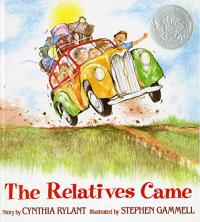
While sitting on the log in the meadow, Mr. Franklin asks young Bet to read aloud. Little does she realize that she’ll soon befriend a small mole. This rollicking story includes a bit of magic, a hint of history, and an atmospheric setting that together reveal the essence of friendship.
The Little Gentleman

To escape the horrors of slavery, some people who remembered the old magic flew away from their enslavement. This is a richly illustrated homage to the reteller of the folktale (that first appeared in a 1985 collection) and to the dignity and history of African Americans.
The People Could Fly: The Picture Book

A large, slightly frumpy family travels to visit their equally large and frumpy relatives to share food, conversation, and a good time, proving that there’s always room for one more! The relatives’ visit is humorously chronicled in the lively illustrations and understated text of this Caldecott Honor book.
The Relatives Came

Dorothy may have thought there’s no place like home when she clicked her ruby slippers, but the wanderlust of her native state is what starts all the trouble here. Kansas is bored and gets best friend Nebraska to help stir things up. Soon they’re throwing a potluck party for all the states and everyone delights in the idea of seeing another part of the country. Readers will unwittingly learn more than they would ever have thought while poring over the witty remarks exchanged over state lines.
The Scrambled States of America

More than anything, 14-year-old Ida Bidson wants to become a teacher. But her dream falters when the one-room school in her remote Colorado town shuts down. Her only hope is to keep the school open without anyone finding out. Yet even a secret school needs a teacher. Is Ida ready to take charge?
The Secret School

Told in the form of a recollection, these “confessions” cover 13-year-old Charlotte’s eventful 1832 transatlantic crossing. She begins her trip as a prim schoolgirl returning from England to her home and family in America, but by the end she is in command of the Seahawk.
The True Confessions of Charlotte Doyle

While they wait to go back into the water, Lolly, Sam, and Spider pass the time by telling stories to each other. One story is so vividly told, the monster seems to come alive! The deadpan language is very humorous, and is complemented by simple line-and-wash illustrations.
Three By the Sea

Frankie lives in Brooklyn, New York, during World War II. He has an active imagination that is enhanced by popular radio shows: The Green Hornet, The Lone Ranger, and others. The story, setting, and characters unfold through the dialogue of the characters and the radio shows to which they listen.
“Who Was That Masked Man, Anyway?”

Wilfrid helps an elderly friend, Miss Nancy, regain lost memories by bringing her some of her favorite things to remind her of them. This is a tender story of a friendship between two very different people, both of whom have four names, and the nature of memories.
Wilfrid Gordon McDonald Partridge

Life as a paper-thin boy is not all bad as Stanley finds out. He was flattened by a bulletin board bit adjusts quite well with the help of his parents to his new dimensions — all of which makes for very funny reading (and travels in later books about Stanley and his family).
Flat Stanley: His Original Adventure

Joey Pigza really wants his six-week visit with his dad to count, to show him he’s not as wired as he used to be, to show his dad how much he loves him. But Carter Pigza’s not an easy guy to love. He’s eager to make it up to Joey for past wrongs and to show him how to be a winner, to take control of his life. With his coaching, Joey’s even learned how to pitch a baseball, and he’s good at it. The trouble is, Joey’s dad thinks taking control means giving up the things that “keep Joey safe”. And if he wants to please his dad, he’s going to have to play by his rules, even when the rules don’t make sense.
Joey Pigza Loses Control

Just like other kids, Zinkoff rides his bike, hopes for snow days, and wants to be like his dad when he grows up. But Zinkoff also raises his hand with all the wrong answers, trips over his own feet, and falls down with laughter over a word like “Jabip.” Other kids have their own word to describe him, but Zinkoff is too busy to hear it. He doesn’t know he’s not like everyone else. And one winter night, Zinkoff’s differences show that any name can someday become “hero.”
